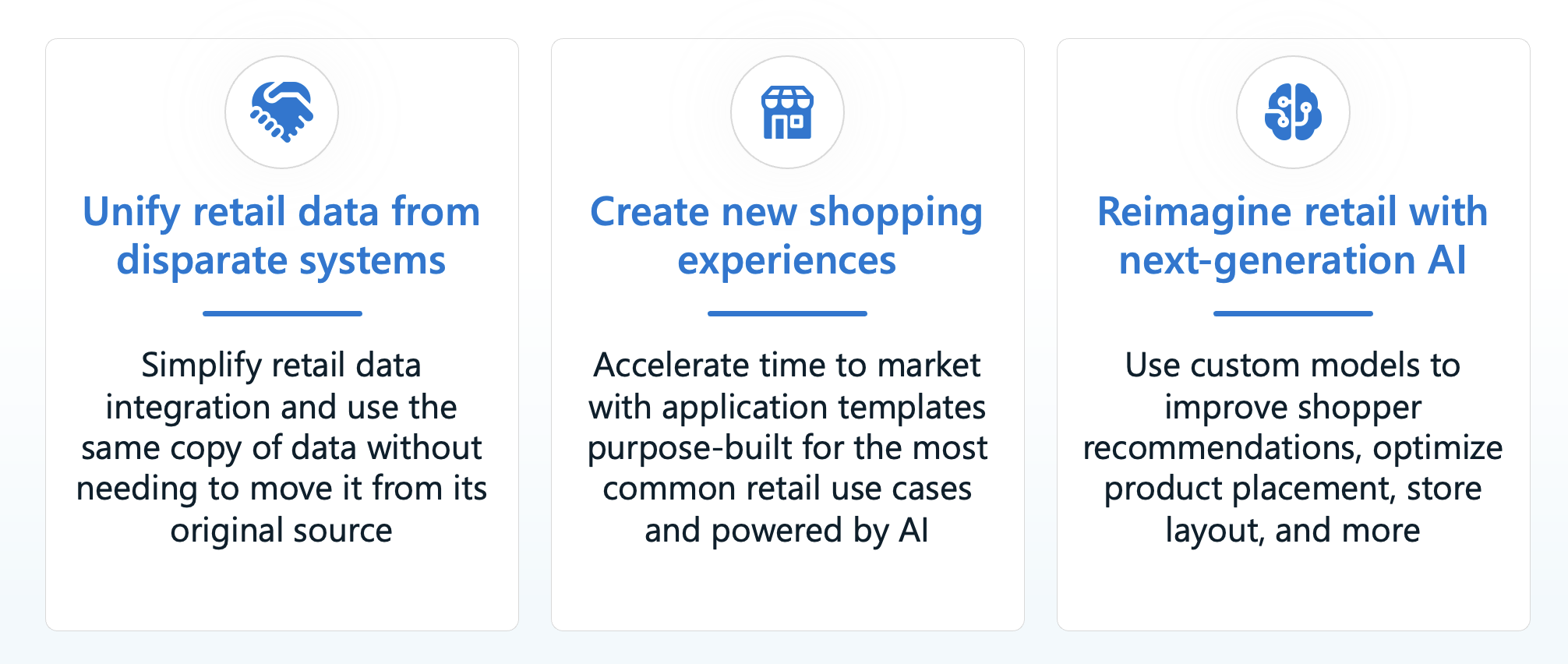Retail data solutions and AI readiness
Retail data solutions, integral to Microsoft Cloud for Retail, are powered by generative AI and Microsoft Fabric. These solutions represent a specialized workload that incorporates the capabilities of Microsoft Fabric. It seamlessly integrates into the Microsoft retail ecosystem, offering retailers a robust platform to address their data challenges and unlock new opportunities.
With Retail data solutions in Microsoft Fabric, retailers can build an AI-ready data estate for tomorrow while realizing business value today. To ease their journey to AI readiness, retailers can unify their data by using Microsoft Fabric and then use the built-in application templates in Retail data solutions to get reliable insights from their data.
Retail data solutions include scenario-focused application templates that reduce time to market and are purpose-built for retail-specific scenarios. All application templates act as starter kits, and retailers can fully customize and extend the templates to meet their unique needs. Retailers can use retail-specific scenarios that are available as application templates if they already use Retail data solutions.
Application templates/connectors from specialized partners are also available with Retail data solutions. Retailers can also access AI/ML models and language models, such as Frequently bought together or others. All capabilities are deeply integrated with each other, allowing retailers to seamlessly use data to generate unique insights that aren't possible in silos.
The following screenshot shows the pillars of this journey.
The following sections discuss each pillar in more detail.
Unify retail data from disparate systems
Retail data solutions use Microsoft Fabric and OneLake to simplify and help streamline the process of retail data integration. By using Retail data solutions, retailers can use a single copy of the data without needing to move it from its original source.
OneLake is the unified data lake solution included with every Microsoft Fabric tenant. It helps you bring data together in an intuitive hub automatically indexed for discovery, sharing, governance, and compliance. OneLake breaks down data silos and streamlines your retail analytics, and it serves as the central hub for all your data needs.
By using OneLake, you unlock several benefits that drive better outcomes for your organization. OneLake is designed to be the single place for all your retail analytics data, and it allows for quicker and more accurate prediction of consumer behavior and trends. It also facilitates faster access to site behavior data, such as the time that people spend on site and the products they browse. Moreover, it contributes to the improvement of retail data quality and accuracy.
Retail data solutions use the power of Microsoft and non-Microsoft connectors to the most common retail data sources, providing retailers with the following flexibilities:
Access out-of-the-box connectors to public and private data providers and sources. Additionally, retailers can use these connectors with their own licenses.
Extract, harmonize, and store data with predefined transformation to the identified data source systems.
Get across real or near-real time data and access disparate systems for faster decision making.
Retailers can enhance their analysis by consolidating and harmonizing data. This process involves minimizing retail data duplication and movement, standardizing retail data governance, quality, and security rules across datasets, and reducing discrepancies in shopper and operational data. By simplifying cross-application workflows, retailers can increase efficiency and productivity in their operations.
Enriching your data can have a profound impact on various aspects of your retail business. It can enhance market segmentation, facilitate more accurate customer profiling, and help in trend analysis. Furthermore, it can optimize inventory management, inform pricing strategies, and allow for more targeted marketing campaigns.
Create new shopping experiences
With Retail data solutions, retailers can accelerate time to market with application templates that are built for the most common retail use cases and that are powered by AI. Retail managers can use custom models to enhance shopper recommendations, optimize product placement, refine store layout, and achieve other operational improvements.
Microsoft copilot and application templates, which are customized to retail, help retailers build on the benefits of a unified data estate by offering them the following capabilities:
Accelerating time to value by choosing to buy instead of build
Customizing to suit unique retail needs
Having the system automatically update underlying AI models
Retailers can elevate the shopping experience with templates that are built on the capabilities of generative AI, allowing for rich customer conversations on products that match each customer's unique needs.
The Personalized Shopping Agent uses natural language to provide your customers with a unique retail experience. Shoppers ask for and view products by expressing intent through natural language understanding, contextual awareness, and human-like responses. Consider the template as similar to a knowledgeable companion. The template bases its guidance on a comprehensive knowledge of the customer and retailer experiences in the following areas: items, styles, availability, order history, demographic details, brand voice, and style.
Reimagine retail with next-generation AI
Retail enterprises can expedite their time to market by using application templates that are designed for prevalent retail scenarios using AI capabilities. Retailers can use Retail data solutions in Microsoft Fabric as the foundation for continuous innovation to improve shopper recommendations and to optimize product placement, store layout, and more.
Automating personal workflows and processes and using low-code tools can help retailers drive innovation with AI/ML and language models in the following areas:
Frequently bought together
Custom demand forecasting
Customer sentiment analysis
Predictive marketing strategies
Retail data solutions also help retailers build more by connecting them with the partner ecosystem to:
Develop new AI/ML models by using data available in Retail data solutions.
Introduce language models with faster time to market by using their data.
Build specialized solutions faster.

